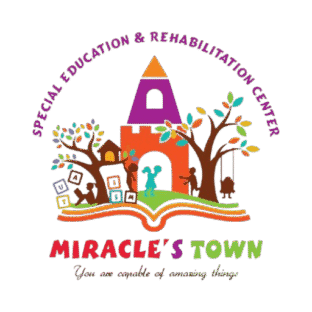Our Services:
➤ ABA (Behavioral Therapy)
➤ Speech Therapy
➤ Functional Academics
➤ Occupational Therapy
➤ Life Skills
➤ Vocational Training
➤ Early Intervention
➤ Educational & School-Based therapy
➤ Physical Activities
➤ Music
➤ Online Sessions
➤ Home Based plans
➤ ABA (Behavioral Therapy)



What is ABA?
Applied Behavior Analysis (ABA) is a science-based approach dedicated to understanding and supporting human behavior. ABA often involves a 1:1 ratio between a child and a Behavior Technician, though other service models can include group settings or multiple technicians per child for more complex cases. It aims to teach meaningful skills while reducing behaviors that may interfere with learning and daily life. While commonly associated with supporting individuals with autism and developmental differences, ABA principles can benefit everyone.
Core Areas of Focus:
ABA examines how behavior is influenced by the environment and focuses on positive changes that enable learning and growth. The ultimate goal is to build independence and improve quality of life by addressing areas such as:
. Communication
. Social skills
. Challenging behaviors
. Adaptive learning
. School readiness
. Career preparation
. Hygiene and grooming
. Emotional regulation
. Adjusting to routine changes
. Toilet training
. Attending to non-preferred tasks
How Does ABA Therapy Help?
ABA therapy is highly individualized, tailoring each program to a child’s unique strengths, needs, and abilities. By leveraging evidence-based strategies, ABA can bring positive changes to everyday life. The therapy focuses on two main objectives:
. Teaching new skills that are applicable across various environments.
. Equipping caregivers with effective tools and strategies to support lifelong development.
Examples of ABA in Everyday Life
ABA strategies can be found everywhere, often integrated seamlessly into daily routines.
. Building Communication Skills: ABA helps children express their needs through words, gestures, or visual aids, empowering them to communicate effectively.
. Reducing Challenging Behavior: ABA identifies triggers for behaviors like tantrums and introduces healthier ways to communicate needs.
. Helping with Social Skills: ABA provides structured support to develop essential social interactions, such as making friends, sharing, and taking turns.
Why Does ABA Matter?
Every child is unique, and ABA respects their individuality by offering tailored support. The focus is not on conformity but on empowering children to thrive in their own way.Research highlights the positive impact of ABA therapy on children diagnosed with Autism Spectrum Disorder and other developmental challenges. By fostering growth and independence, ABA enhances the overall quality of life for children and their families.
ABA Therapy Settings and Commitments
ABA therapy is flexible and adaptable, but consistency and time are crucial for success. Programs vary based on the child’s needs.
___________________________________________________________________________________________________________________________________________________________
Speech Therapy



Speech therapy focuses on improving communication, language skills, and addressing speech. It is a personalized approach that helps individuals express themselves effectively and understand others, enhancing their overall quality of life.
What is Speech Therapy?
Speech therapy is a specialized field that involves evaluating, diagnosing, and treating various speech, and language difficulties. Speech therapists, also known as speech-language pathologists (SLPs), work with individuals of all ages to improve their communication abilities and address challenges such as articulation, fluency, voice, and comprehension.
Core Areas of Focus:
Speech therapy covers a wide range of skills, including:
. Articulation: Correcting pronunciation and sound formation.
. Fluency: Addressing stuttering or cluttering to improve speech flow.
. Voice: Enhancing vocal quality, pitch, and volume.
. Language: Improving understanding and expression of words and sentences.
How Does Speech Therapy Help?
Speech therapy is highly individualized, tailored to the specific needs and goals of each person. It helps individuals:
. Communicate more effectively in daily life.
. Build confidence in social interactions.
. Improve academic and professional performance.
Examples of Speech Therapy in Everyday Life
. Articulation Practice: Teaching a child to pronounce sounds correctly, such as saying “this” instead of “thith.”
. Fluency Exercises: Helping individuals speak smoothly without interruptions or repetitions.
. Language Development: Supporting children in forming sentences and expanding their vocabulary.
. Voice Therapy: Assisting individuals in managing voice disorders, such as hoarseness or loss of voice.
Why Speech Therapy Matters?
Speech therapy is not just about improving communication it’s about empowering individuals to express themselves confidently and connect with others. It fosters independence, inclusion, and a sense of achievement, making a significant impact on daily life.
Caregiver and Community Involvement
Caregivers and communities play a crucial role in supporting speech therapy by:
. Reinforcing communication skills at home.
. Encouraging participation in social activities.
. Collaborating with therapists to ensure consistent progress.
___________________________________________________________________________________________________________________________________________________________
Functional Academics





Functional academics focus on teaching practical applications of academic skills to help individuals navigate daily life with greater independence and confidence.
What is Functional Academics?
Functional academics emphasize the real-life application of academic skills, such as reading, writing, and problem-solving. The goal is to equip individuals with the knowledge and abilities they need to function effectively in their daily lives. This approach is particularly beneficial for individuals with intellectual disabilities or those who face challenges in traditional academic settings. Functional academics aim to enhance independence, communication, and problem-solving skills, ultimately improving quality of life.
How Does Functional Academics Help?
Functional academics provide a highly individualized approach, tailored to each person’s strengths, needs, and goals. By focusing on practical skills, this approach helps individuals:
. Gain independence in daily activities.
. Improve communication and social interactions.
. Enhance problem-solving abilities.
Examples of Functional Academics in Everyday Life:
. Money Management: Teaching a student how to budget, make purchases, or give correct change.
. Time Management: Helping individuals read clocks, follow schedules, and plan their day.
. Health and Safety: Educating about healthy eating, basic hygiene, and first aid.
. Social Skills: Practicing how to interact in social settings, such as introducing oneself or asking for help.
Why Functional Academics Matter?
Every individual is unique, and functional academics are designed to meet their specific needs. The focus is not on achieving academic perfection but on providing tools that enable individuals to thrive in their own way. This approach fosters inclusion, independence, and a sense of accomplishment.
Caregiver Involvement:
Caregivers play a crucial role in supporting functional academics by:
. Reinforcing skills at home.
. Encouraging independence in daily tasks.
. Collaborating with educators and therapists to ensure progress.
Functional academics empower individuals to lead more fulfilling lives by focusing on what truly matter practical skills that make a difference every day.
___________________________________________________________________________________________________________________________________________________________
Occupational Therapy




Occupational therapy focuses on helping individuals develop, recover, or maintain the skills needed for daily living and working. It is a holistic and personalized approach that empowers individuals to overcome physical, emotional, or cognitive challenges, enabling them to lead independent and fulfilling lives.
What is Occupational Therapy?
Occupational therapy is a healthcare profession that addresses barriers to performing everyday tasks. It helps individuals adapt to their environments, develop new skills, and find alternative ways to accomplish activities. The term “occupation” refers to meaningful activities, such as self-care, work, education, and leisure.
Core Areas of Focus:
Occupational therapy covers a wide range of areas, including:
. Physical Rehabilitation: Improving motor skills and adapting to physical limitations.
. Cognitive Development: Enhancing memory, problem-solving, and organizational skills.
. Sensory Integration: Addressing sensory processing challenges to improve focus and comfort.
. Mental Health Support: Building coping strategies and emotional resilience.
.Daily Living Skills: Teaching practical tasks like dressing, cooking, and cleaning.
How Does Occupational Therapy Help?
Occupational therapy is tailored to each individual’s needs and goals. It helps by:
. Promoting independence in daily activities.
. Enhancing physical and mental well-being.
. Supporting caregivers with effective strategies.
. Improving social and communication skills.
Examples of Occupational Therapy in Everyday Life:
. Physical Rehabilitation: Helping someone regain mobility after an injury or surgery.
.Sensory Integration: Assisting children with sensory sensitivities to focus in school.
. Daily Living Skills: Teaching individuals how to use adaptive tools for cooking or dressing.
. Workplace Adaptation: Modifying workspaces to accommodate physical or cognitive challenges.
Why Occupational Therapy Matters?
Occupational therapy is not just about overcoming challenges it’s about empowering individuals to live their lives to the fullest. It fosters independence, confidence, and a sense of achievement, making a meaningful impact on overall quality of life.
Caregiver and Community Involvement:
Caregivers and communities play a vital role in occupational therapy by:
. Encouraging participation in meaningful activities.
. Collaborating with therapists to ensure consistent progress.
. Creating supportive environments for growth and development.
Occupational therapy is a transformative journey that helps individuals overcome barriers and achieve their goals.
___________________________________________________________________________________________________________________________________________________________
Life Skills

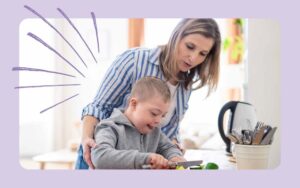



Life skills are essential abilities that empower individuals to navigate daily life, make informed decisions, and interact effectively with others. These skills are foundational for personal growth, independence, and success in various aspects of life.
What are Life Skills?
Life skills refer to a set of practical, cognitive, and social abilities that help individuals manage challenges, solve problems, and adapt to different situations. They encompass a wide range of competencies that are crucial for leading a productive and fulfilling life.
Core Areas of Focus:
Life skills can be categorized into several key areas, including:
. Communication Skills: Expressing thoughts clearly, listening actively, and understanding non-verbal cues.
. Decision-Making: Evaluating options and making choices that align with goals and values.
. Problem-Solving: Identifying challenges and finding effective solutions.
. Emotional Intelligence: Managing emotions, building resilience, and empathizing with others.
. Social Skills: Developing healthy relationships, teamwork, and conflict resolution.
. Time Management: Prioritizing tasks and using time efficiently.
. Self-Care: Maintaining physical, mental, and emotional well-being.
How Do Life Skills Help?
Life skills are highly adaptable and beneficial in various contexts. They help individuals:
. Build confidence and independence.
. Enhance interpersonal relationships and communication.
. Improve decision-making and problem-solving abilities.
. Manage stress and emotions effectively.
. Achieve personal and professional goals.
Examples of Life Skills in Everyday Life:
. Effective Communication: Writing emails, participating in discussions, or resolving misunderstandings.
. Decision-Making: Choosing a career path or planning a budget.
. Problem-Solving: Finding solutions to workplace challenges or managing household tasks.
. Emotional Intelligence: Staying calm under pressure or supporting a friend in need.
. Social Skills: Networking, collaborating on projects, or making new friends.
Why Life Skills Matter?
Life skills are not just about surviving they are about thriving. They empower individuals to adapt to change, overcome obstacles, and lead meaningful lives. Developing life skills fosters independence, resilience, and a sense of accomplishment.
Caregiver and Community Involvement:
Caregivers and communities play a vital role in fostering life skills by:
. Encouraging participation in activities that build confidence and competence.
. Providing guidance and support in challenging situations.
. Creating environments that promote learning and collaboration.
Life skills are the foundation for a successful and fulfilling life, enabling individuals to adapt, grow, and achieve their goals.
___________________________________________________________________________________________________________________________________________________________
Vocational Training
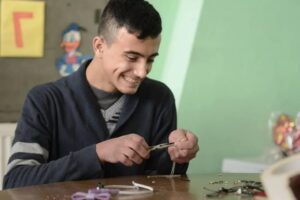

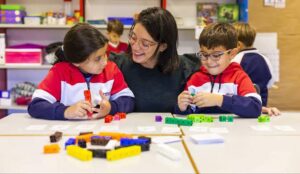
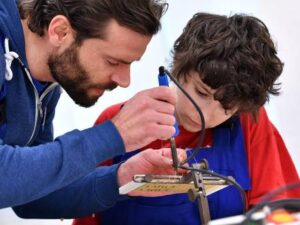
Vocational training focuses on equipping individuals with practical skills and knowledge tailored to specific trades or professions. It bridges the gap between education and employment, empowering individuals to thrive in their chosen careers. This hands-on approach is ideal for those seeking specialized expertise and immediate job readiness.
What is Vocational Training?
Vocational training provides targeted education in areas such as technical skills, craftsmanship, and service-oriented professions. It emphasizes real-world applications, preparing individuals for specific roles in industries like healthcare, technology, construction, and more. The goal is to foster independence, confidence, and employability.
How Does Vocational Training Help?
Vocational training is highly individualized, catering to the unique needs and aspirations of each learner. It helps individuals:
. Gain specialized expertise in their chosen field.
. Build confidence through hands-on experience.
. Enhance employability and career prospects.
. Adapt to industry demands and technological advancements.
Why Vocational Training Matters?
Vocational training is not just about acquiring skills it’s about empowering individuals to achieve their career goals and contribute meaningfully to society. By focusing on practical applications, vocational training ensures learners are confident in their abilities.
Caregiver and Community Involvement:
Caregivers and communities play a vital role in supporting vocational training by:
. Encouraging skill development and lifelong learning.
. Collaborating with training providers to ensure progress.
. Promoting inclusivity and accessibility in vocational education.
Vocational training is a gateway to independence and success, offering individuals the tools they need to excel in their chosen paths.
___________________________________________________________________________________________________________________________________________________________
Educational
&
School-Based Therapy




Educational and school-based therapy focuses on supporting students’ academic, social, and emotional development within the institute environment. These therapies are designed to address individual needs, ensuring that every child has the opportunity to thrive in their educational journey.
What is Educational and School-Based Therapy?
This type of therapy involves a range of interventions provided within institutes to help students overcome challenges that may impact their learning and participation. It includes services like speech therapy, occupational therapy, physical therapy, and behavioral support, tailored to each student’s unique needs.
Core Areas of Focus:
Educational and school-based therapy addresses various aspects, including:
. Academic Support: Enhancing skills like reading, writing, and math through specialized strategies.
. Social Skills Development: Teaching students how to interact positively with peers and teachers.
. Behavioral Interventions: Managing challenging behaviors and promoting positive actions.
. Physical and Motor Skills: Supporting mobility, coordination, and physical participation in school activities.
. Communication Skills: Improving speech, language, and non-verbal communication.
How Does Educational and School-Based Therapy Help?
These therapies are individualized and goal-oriented, helping students:
. Overcome barriers to learning and participation.
. Build confidence and independence in the classroom.
. Develop essential life skills for academic and social success.
. Foster inclusion and collaboration with peers.
Examples of Educational and School-Based Therapy in Action:
. Speech Therapy: Helping a student articulate sounds clearly or expand their vocabulary.
.Occupational Therapy: Teaching a child how to hold a pencil or use adaptive tools for writing.
. Behavioral Support: Implementing strategies to reduce disruptive behaviors and improve focus.
.Physical Therapy: Assisting a student in navigating the school environment safely and independently.
Why Educational and School-Based Therapy Matters?
These therapies ensure that every student, regardless of their challenges, has access to a supportive and inclusive learning environment. They empower students to reach their full potential, both academically and socially.
Settings and Commitments:
Educational and school-based therapy is typically provided during school hours and integrated into the student’s daily routine. Collaboration between therapists, teachers, and caregivers is essential to ensure consistent progress and reinforcement of skills.
Caregiver and Community Involvement:
Caregivers and communities play a vital role by:
. Supporting therapy goals at home.
. Encouraging participation in institute activities.
. Collaborating with educators and therapists to track progress.
Educational and school-based therapy is a cornerstone of inclusive education, helping students overcome challenges and achieve success in their unique ways.
___________________________________________________________________________________________________________________________________________________________
Physical Activities




Physical activities are essential for promoting overall health, well-being, and development. They encompass a wide range of movements and exercises that engage the body, improve physical fitness, and enhance mental health. Whether structured or unstructured, physical activities play a vital role in fostering growth, coordination, and social interaction.
What are Physical Activities?
Physical activities refer to any bodily movements that require energy expenditure. These activities can range from light exercises, such as walking, to more vigorous ones, like running or playing sports. They are crucial for maintaining a healthy lifestyle and are beneficial for individuals of all ages and abilities.
Core Areas of Focus:
Physical activities can be categorized into several types, including:
. Aerobic Activities: Running, swimming, cycling, or brisk walking to improve cardiovascular health.
. Strength Training: Exercises like push-ups, weightlifting, or resistance training to build muscle strength.
. Flexibility Exercises: stretching, or Pilates to enhance mobility and prevent injuries.
. Balance Activities: Tai chi, balance drills, or walking heel-to-toe to improve stability and coordination.
How Do Physical Activities Help?
Engaging in regular physical activities offers numerous benefits, such as:
. Enhancing physical fitness and endurance.
. Reducing the risk of chronic diseases like diabetes and heart conditions.
. Improving mental health by reducing stress, anxiety, and depression.
. Boosting cognitive function and focus.
. Promoting better sleep and overall well-being.
Examples of Physical Activities in Everyday Life:
. Recreational Activities: playing team sports like basketball.
. Daily Tasks: Gardening, climbing stairs, or walking to nearby destinations.
. Structured Exercises: swimming or exercise sessions.
. Playful Activities: Games like tag, hide-and-seek, or skipping rope for children.
Why Physical Activities Matter?
Physical activities are not just about fitness they are about fostering a healthy and active lifestyle. They help individuals build confidence, develop social skills, and achieve a sense of accomplishment. For children, physical activities are crucial for motor skill development and healthy growth.
Caregiver and Community Involvement:
Caregivers and communities play a significant role in encouraging physical activities by:
. Providing opportunities for participation in sports and recreational events.
. Creating safe and accessible environments for exercise.
. Supporting individuals in setting and achieving fitness goals.
Physical activities are a cornerstone of a healthy and fulfilling life, offering countless opportunities for growth, connection, and joy.
___________________________________________________________________________________________________________________________________________________________
Music Therapy





Music is a universal therapy one that goes beyond words to inspire, heal, and connect. At Miracle’s Town we incorporate music therapy as a meaningful tool to support the developmental, emotional, and social growth of children with special needs.
How Music Therapy Helps?
Music therapy is scientifically proven to engage different areas of the brain, offering benefits such as:
. Enhancing Communication: Rhythm and melody help children express themselves beyond spoken words.
. Encouraging Emotional Well-being: Music fosters relaxation and emotional regulation, creating a safe space for self-expression.
. Boosting Cognitive Development: Songs and musical activities improve memory, attention, and problem-solving skills.
. Strengthening Social Connections: Group music-making encourages interaction, teamwork, and confidence.
. Supporting Physical Coordination: Rhythmic exercises enhance motor skills and body awareness.
Our Approach
At Miracle’s Town, we integrate music therapy into our personalized educational plans, ensuring each child benefits in a way that suits their unique needs. Whether through interactive sessions, guided listening, or hands-on musical activities, we create an environment where children can learn, grow, and thrive through the power of music.
___________________________________________________________________________________________________________________________________________________________
Online Sessions




Online sessions provide a flexible and accessible way to deliver education, therapy, or skill-building activities through virtual platforms. They are designed to connect individuals with professionals and resources, ensuring personalized support from the comfort of home.
What are Online Sessions?
Online sessions are virtual sessions conducted via video conferencing tools, such as Zoom, Microsoft Teams, or Google Meet. They cater to a wide range of needs, including educational lessons, therapeutic interventions, and collaborative activities. These sessions are ideal for individuals seeking convenience and adaptability in their schedules.
Core Areas of Focus:
Online sessions can include various services, such as:
. Educational Support: Virtual classes, tutoring, or skill-building workshops.
. Therapeutic Services: Speech therapy, occupational therapy, or counseling.
. Collaborative Learning: Group discussions, brainstorming, or project planning.
. Skill Development: Vocational training, language learning, or creative workshops.
How Do Online Sessions Help?
Online sessions are highly adaptable, offering benefits such as:
. Accessibility from any location with an internet connection.
. Flexibility to fit individual schedules and preferences.
. Personalized support tailored to specific goals and needs.
. Opportunities for collaboration and interaction with peers.
Examples of Online Sessions in Action:
. Educational Classes: Virtual lessons for academic subjects or specialized skills.
. Therapeutic Interventions: Speech therapy sessions conducted online with a licensed therapist.
. Group Activities: Online workshops for team-building or creative projects.
Why Online Sessions Matter?
Online sessions break geographical barriers, making education and therapy accessible to a wider audience. They foster inclusion, convenience, and adaptability, ensuring individuals can achieve their goals without compromising their routines.
Settings and Commitments:
Online sessions can be conducted in various formats, such as:
. Live Sessions: Real-time interactions with professionals or peers.
. Recorded Sessions: Pre-recorded lessons or activities for flexible access.
. Interactive Platforms: Tools that allow screen.
___________________________________________________________________________________________________________________________________________________________
Early Intervention Therapy



Early intervention therapy provides essential support for young children with developmental delays or disabilities, ensuring they receive the right tools for growth during their most formative years. At Miracle’s Town, we focus on creating individualized programs tailored to each child’s unique needs, fostering their cognitive, social, emotional, and physical development.
Key Areas of Early Intervention
. Individualized education plans are designed to enhance learning outcomes
. Speech and language therapy to improve communication skills
. Occupational therapy to support fine motor development and sensory processing
. Applied Behavior Analysis (ABA) for behavioral and social growth
. Sensory therapy to regulate responses and encourage engagement
. Parent training and support to reinforce development at home
By integrating these therapies into a structured and nurturing environment, we help children build confidence, develop essential life skills, and prepare for future educational opportunities.
___________________________________________________________________________________________________________________________________________________________
Home–Based Therapy Plans




Home-based therapy provides personalized support for children in the comfort of their own homes, allowing them to develop essential skills in a familiar environment. These plans are designed to cater to individual developmental, sensory, and behavioral needs while ensuring consistent progress.
Services Offered:
. Customized therapy sessions tailored to each child’s needs
. Speech and language therapy to improve communication and social skills
. Occupational therapy focusing on fine motor development and daily activities
. Behavioral therapy to encourage emotional regulation and positive interactions
. Sensory integration therapy to help children adjust to different stimuli
. Parent coaching for guidance and support in implementing strategies at home
How It Works?
Therapists conduct structured sessions at home, using targeted techniques and activities to foster engagement and development. Parents are actively involved in the process to reinforce learning and ensure progress beyond the sessions.
This approach helps create a comfortable, accessible, and effective learning environment, ensuring children receive the support they need without disruption to their routine.
___________________________________________________________________________________________________________________________________________________________
